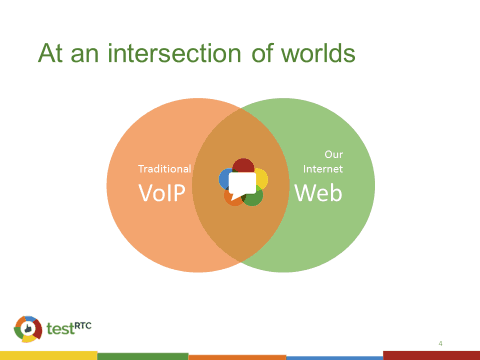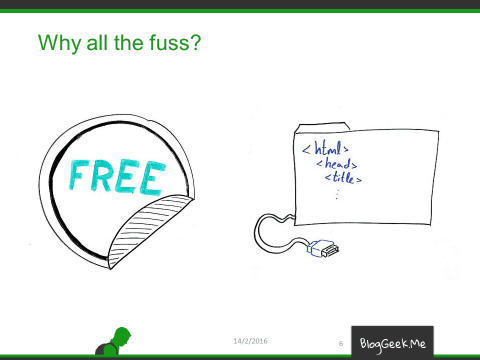Probably not.
I wrote about Peer-to-Peer and WebRTC recently, and got this interesting question due to it from Fabian Bernhard on LinkedIn:
Without arguing about the quality of a specific Open Source media stack, would you say that WebRTC was as big a thing if it didn’t run in a web browser?
I guess the answer is no it wouldn’t be that big a thing.
Here’s where I am getting at it. There are two popular slides I usually use:

The one above explains that WebRTC sits at an intersection – it appeals both to VoIP people as well as to Web people.

The second slide above is about what makes WebRTC so transformative – it is about the fact that it is Free, but also because it is available for Web people.
Without the web browser part, we would have been left with only Free.
We’ve had open source media engines before. GStreamer is a popular one. Codecs were a bit harder to come by – especially those that don’t require patent payments (royalty free). It wasn’t the best thing out there, but it worked – people still use it today.
WebRTC made the open source version of a media engine as good as a commercial one – it came out of an acquisition of a commercial media engine vendor after all.
But that’s where it stops – it wouldn’t have made such a transformation in the market – it would be more of the same with a small evolutionary step. Nothing to write home about.
The browser bit, though… that made VoIP available and open to everyone with some HTML and JS experience – a lot larger pool of talent – and one dabbling a lot in experimentation. This is what got us so many use cases.
Mobile might be different
For mobile only use cases, WebRTC would have made all the difference – same as it does today. The idea behind it in mobile isn’t that it offers a browser experience or that it is available in the browser (it isn’t on iOS). The idea is that it would have been the cheapest route to a product than anything else out there. And with the trend of communications moving in-app, that would still make the impact it does there relevant.
Which brings us full circle.
Let’s assume mobile is eating up the world. Let’s assume it is only a matter of time until content creation and not only content consumption moves from the PC to mobile. Once that happens – who cares about what happens in the browser?
It will all be in-app anyway.
And there – WebRTC is making a difference.
Need to know where WebRTC is available? Download this free WebRTC Device Cheat Sheet.

the biggest difference to what we did not have a free media engine combined with an excellent networking stack that is maintained by a fairly large dedicated team.
Now for how long it makes sense for Google to maintain that team…